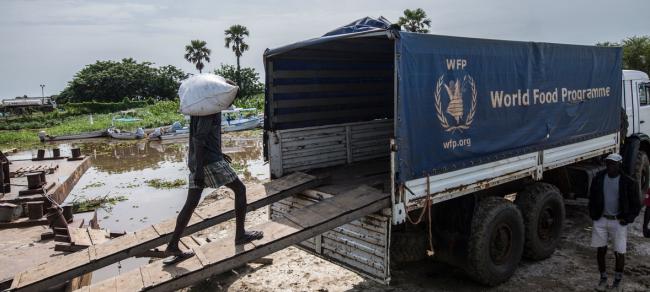
First South Sudan river convoy in five years, delivers UN aid to remote areas
New York, Oct 10 (IBNS): For the first time since civil war erupted in South Sudan in 2013, a United Nations food convoy has managed to deliver thousands of tonnes of aid by river, to people in seven hard-to-reach locations, saving millions of dollars on costly aid flights.
The World Food Programme (WFP) convoy transported just over 750 tonnes of food and nutrition supplies up the Sobat river, a major tributary of the White Nile.
This meant negotiating access and security guarantees to allow safe-passage for the vessels through the Greater Upper Nile region, where thousands of South Sudanese people have been displaced by the war, said WFP.
The first convoy was loaded in Renk, composed of one barge and 11 smaller vessels that transported supplies of sorghum, pulses, vegetable oil and porridge - enough to sustain 40,000 people for one month.Life-saving aid for the isolated counties of Ulang, Luapiny and Nyirol, was previously only delivered by airdrop, which costs around six times more than using river or road transport.
According to a new Integrated Food Security Phase Classification (IPC) report, backed by multiple UN agencies, 6.1 million people in South Sudan - approximately half of the population - face severe food shortages.
Millions of people don’t know where their next meal is coming from”, said Adnan Khan, WFP’s Country Director in South Sudan. “They urgently need humanitarian assistance. Without it, they face serious challenges. The opening of more viable delivery routes helps us to reach more people and get to them more efficiently.”
In response to these growing humanitarian needs, WFP is now providing emergency food supplies to 5 million people using road, air and river routes.
WFP/Gabriela Vivacqua
Support Our Journalism
We cannot do without you.. your contribution supports unbiased journalism
IBNS is not driven by any ism- not wokeism, not racism, not skewed secularism, not hyper right-wing or left liberal ideals, nor by any hardline religious beliefs or hyper nationalism. We want to serve you good old objective news, as they are. We do not judge or preach. We let people decide for themselves. We only try to present factual and well-sourced news.







